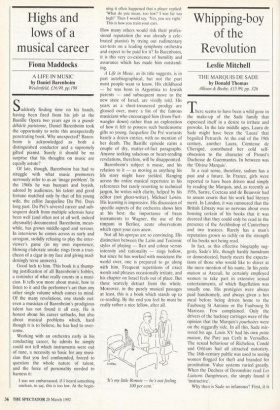Highs and lows of a musical career
Fiona Maddocks
A LIFE IN MUSIC by Daniel Barenboim Weidenfeld, £16.99, pp. 198 Suddenly finding time on his hands, having been fired from his job at the Bastille Opera two years ago in a grande debacle parisienne, Daniel Barenboim took the opportunity to write this unexpectedly penetrating book. Why unexpected? Baren- boim is acknowledged as both a distinguished conductor and a supremely gifted pianist. Surely it should be no surprise that his thoughts on music are equally astute?
Of late, though, Barenboim has had to struggle with what music promoters nervously refer to as an 'image problem'. In the 1960s he was buoyant and boyish, adored by audiences, his talent and good fortune matched only by that of his young wife, the cellist Jacqueline Du Pre. Days long past. Du Pre's severed career and sub- sequent death from multiple sclerosis have been well (and often not at all well, indeed abysmally) documented. Barenboim, mean- while, has grown middle-aged and serious. In interviews he comes across as surly and arrogant, stolidly refusing to play the inter- viewer's game (in my own experience, blowing elaborate smoke rings from a trun- cheon of a cigar in my face and giving mad- deningly terse answers).
Good luck to him. This book is a thump- ing justification of all Barenboim's foibles, a reminder of what really counts in a musi- cian. It tells you more about music, how to listen to it and the performer's art than any other single volume which comes to mind. Of the many revelations, one stands out: even a musician of Barenboim's prodigious talent has not found it all easy. He is honest about his career setbacks, but also about musical problems which, hard though it is to believe, he has had to over- come.
Working with an orchestra early in his conducting career, he admits he simply could not tell which instruments were out of tune, a necessity so basic for any musi- cian that you feel confounded, forced to question the whole nature of talent, and the force of personality needed to harness it: I was not embarrassed, if I heard something unclean, to say, this is too low. At the begin- ning it often happened that a player replied: 'What do you mean, too low? I was far too high!' Then I would say, 'Yes, you are right.' This is how you train your cars.
How many others would risk their profes- sional reputation (he was already a cele- brated pianist) by trying out rudimentary ear-tests on a leading symphony orchestra and expect to be paid for it? In Barenboim, it is this very co-existence of humility and assurance which has made him outstand- ing.
A Life in Music, as its title suggests, is in part autobiographical, but not the part most people want to know. His childhood — he was born in Argentina to Jewish parents and subsequent move to the new state of Israel, are vividly told. His years as a short-trousered prodigy are glossed over, more a list of the famous musicians who encouraged him (from Furt- wangler down) rather than an exploration of how it felt to possess such burdensome gifts so young. Jacqueline Du Pre warrants barely a dozen entries, with no mention of her death. The Bastille episode earns a couple of dry, matter-of-fact paragraphs. Anyone seeking salacious or heart-rending revelations, therefore, will be disappointed.
Barenboim's subject is music, and his relation to it — as moving as anything his life story might have yielded. Ranging across the entire musical repertoire in his references but rarely resorting to technical jargon, he writes with clarity, helped by his editor (not ghost-writer), Michael Lewin. His learning is impressive. His discussion of specific aspects of the orchestra shows him at his best: the importance of brass instruments to Wagner, the use of the timpani in Berlioz, acute observations which open your ears anew.
Not all his apergus are so convincing. His distinction between the Latin and Teutonic styles of playing — flair and colour versus intensity and rationality — rings hollow, but since he has worked with musicians the world over, one is prepared to go along with him. Frequent repetitions of exact words and phrases occasionally irritate, and his chapter on Israel feels out of place. But these scarcely detract from the whole. Moreover, in the purely musical passages at least, this is a book which stands up to re-reading. By the end you feel he must be really rather a nice fellow, after all.
'It's my little Ronnie — he's not feeling 100 percent.'


























































 Previous page
Previous page